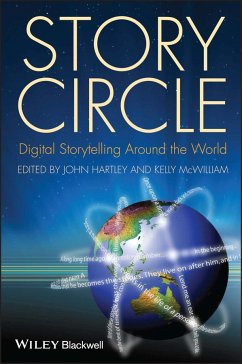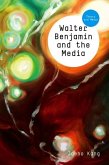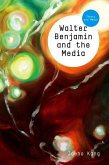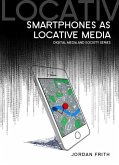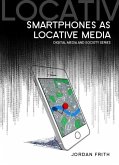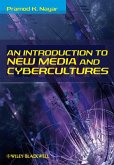Story Circle
Digital Storytelling Around the World
Herausgegeben von Hartley, John; McWilliam, Kelly
Story Circle
Digital Storytelling Around the World
Herausgegeben von Hartley, John; McWilliam, Kelly
- Broschiertes Buch
- Merkliste
- Auf die Merkliste
- Bewerten Bewerten
- Teilen
- Produkt teilen
- Produkterinnerung
- Produkterinnerung
"Where once cultures valued storytellers for lauding, lamenting andlaughing at those in power, this thoughtful book illuminates thehopes, practices and achievements of the myriad amateurstorytellers who populate today s globalised and digitalizedcultures.
Story Circle is the first collection ever devoted to acomprehensive international study of the digital storytellingmovement, exploring subjects of central importance on the emergentand ever-shifting digital landscape.
Covers consumer-generated content, memory grids, the digitalstorytelling youth movement, participatory public history,…mehr
Andere Kunden interessierten sich auch für
![Kittler Now Kittler Now]() Stephen SaleKittler Now22,99 €
Stephen SaleKittler Now22,99 €![Kittler Now Kittler Now]() Stephen SaleKittler Now61,99 €
Stephen SaleKittler Now61,99 €![Walter Benjamin and the Media Walter Benjamin and the Media]() Jaeho KangWalter Benjamin and the Media65,99 €
Jaeho KangWalter Benjamin and the Media65,99 €![Walter Benjamin and the Media Walter Benjamin and the Media]() Jaeho KangWalter Benjamin and the Media24,99 €
Jaeho KangWalter Benjamin and the Media24,99 €![Smartphones as Locative Media Smartphones as Locative Media]() Jordan FrithSmartphones as Locative Media32,99 €
Jordan FrithSmartphones as Locative Media32,99 €![Smartphones as Locative Media Smartphones as Locative Media]() Jordan FrithSmartphones as Locative Media63,99 €
Jordan FrithSmartphones as Locative Media63,99 €![An Introduction to New Media and Cybercultures An Introduction to New Media and Cybercultures]() Pramod K. NayarAn Introduction to New Media and Cybercultures80,99 €
Pramod K. NayarAn Introduction to New Media and Cybercultures80,99 €-
-
-
"Where once cultures valued storytellers for lauding, lamenting andlaughing at those in power, this thoughtful book illuminates thehopes, practices and achievements of the myriad amateurstorytellers who populate today s globalised and digitalizedcultures.
Story Circle is the first collection ever devoted to acomprehensive international study of the digital storytellingmovement, exploring subjects of central importance on the emergentand ever-shifting digital landscape.
Covers consumer-generated content, memory grids, the digitalstorytelling youth movement, participatory public history, audiencereception, videoblogging and microdocumentary
Pinpoints who is telling what stories where, on what terms, andwhat they look and sound like
Explores the boundaries of digital storytelling from China andBrazil to Western Europe and Australia
Story Circle is the first collection ever devoted to acomprehensive international study of the digital storytellingmovement, exploring subjects of central importance on the emergentand ever-shifting digital landscape.
Covers consumer-generated content, memory grids, the digitalstorytelling youth movement, participatory public history, audiencereception, videoblogging and microdocumentary
Pinpoints who is telling what stories where, on what terms, andwhat they look and sound like
Explores the boundaries of digital storytelling from China andBrazil to Western Europe and Australia
Produktdetails
- Produktdetails
- Verlag: Wiley & Sons
- Artikelnr. des Verlages: 1A405180580
- 1. Auflage
- Seitenzahl: 336
- Erscheinungstermin: 31. März 2009
- Englisch
- Abmessung: 231mm x 152mm x 25mm
- Gewicht: 484g
- ISBN-13: 9781405180580
- ISBN-10: 1405180587
- Artikelnr.: 26050351
- Herstellerkennzeichnung
- Libri GmbH
- Europaallee 1
- 36244 Bad Hersfeld
- gpsr@libri.de
- Verlag: Wiley & Sons
- Artikelnr. des Verlages: 1A405180580
- 1. Auflage
- Seitenzahl: 336
- Erscheinungstermin: 31. März 2009
- Englisch
- Abmessung: 231mm x 152mm x 25mm
- Gewicht: 484g
- ISBN-13: 9781405180580
- ISBN-10: 1405180587
- Artikelnr.: 26050351
- Herstellerkennzeichnung
- Libri GmbH
- Europaallee 1
- 36244 Bad Hersfeld
- gpsr@libri.de
John Hartley is Distinguished Professor and ARC Federation Fellow at Queensland University of Technology, and Research Director of the ARC Centre of Excellence for Creative industries and Innovation. He is the author of Television Truths (Wiley-Blackwell 2008) and A Short History of Cultural Studies (2003), and editor of Creative Industries (Wiley-Blackwell 2005). He is Editor of the International Journal of Cultural Studies. Kelly McWilliam is an ARC Postdoctoral Research Fellow (Industry) in the Creative Industries Faculty of Queensland University of Technology. She is the co-author, with Jane Stadler, of Screen Media: Analysing Film and Television (2009) and the author of When Carrie Met Sally: Lesbian Romantic Comedies (2008).
List of Figures
List of Tables
Acknowledgments
Notes on Contributors
Part I: What is Digital Storytelling?
1. Computational Power Meets Human Contact: John Hartley (Queensland
University of Technology) and Kelly McWilliam (Queensland University of
Technology)
2. TV Stories: From Representation to Productivity: John Hartley
(Queensland University of Technology)
3. The Global Diffusion of a Community Media Practice: Digital Storytelling
Online: Kelly McWilliam (Queensland University of Technology)
Part II: Foundational Practices
4. Where It All Started: The Center for Digital Storytelling in California:
Joe Lambert (Center for Digital Storytelling, Berkeley, California)
5. "Capture Wales": The BBC Digital Storytelling Project: Daniel Meadows
(University of Cardiff) and Jenny Kidd (University of Manchester)
6. Digital Storytelling at the Australian Centre for the Moving Image:
Helen Simondson (Australian Centre for the Moving Image)
7. Radio Storytelling and Beyond: Marie Crook (freelance consultant))
Part III: Digital Storytelling Around the World
8. Narrating Euro-African Life in Digital Space: Sissy Helff (University of
Frankfurt) and Julie Woletz (University of Frankfurt)
9. Developing Digital Storytelling in Brazil: Margaret Anne Clarke
(University of Porstmouth)
10. Digital Storytelling as Participatory Public History in Australia: Jean
Burgess (Queensland University of Technology) and Helen Klaebe (Queensland
University of Technology)
11. Finding a Voice: Participatory Development in Southeast Asia: Jo Tacchi
(Queensland University of Technology)
12. The Matrices of Digital Storytelling: Examples from Scandinavia: Knut
Lundby (University of Oslo)
13. Digital Storytelling in Belgium: Power and Participation: Nico
Carpentier (Free University of Brussels and Catholic University of
Brussels)
14. Exploring Self-representations in Wales and London: Tension in the
Text: Nancy Thumim (London School of Economics and Political Science)
Part IV: Emergent Practices
15. Digital Storytelling as Play: The Tale of Tales: Maria
Chatzichristodoulou (University of London)
16. Commercialization and Digital Storytelling in China: Wu Qiongli
(company director)
17. Digital Storytelling with Youth: Whose Agenda Is It?: Lora
Taub-Pervizpour (Muhlenberg College)
18. Digital Storytelling in Education: An Emerging Institutional
Technology?: Patrick Lowenthal (Regis University)
19. Digital Storytelling in Organizations: Syntax and Skills: Lisa Dush
(Massachusetts University of Technology)
20. Beyond Individual Expression: Working with Cultural Institutions: Jerry
Watkins (Swinburne University of Technology) and Angelina Russo (Swinburne
University of Technology)
References
Index
List of Tables
Acknowledgments
Notes on Contributors
Part I: What is Digital Storytelling?
1. Computational Power Meets Human Contact: John Hartley (Queensland
University of Technology) and Kelly McWilliam (Queensland University of
Technology)
2. TV Stories: From Representation to Productivity: John Hartley
(Queensland University of Technology)
3. The Global Diffusion of a Community Media Practice: Digital Storytelling
Online: Kelly McWilliam (Queensland University of Technology)
Part II: Foundational Practices
4. Where It All Started: The Center for Digital Storytelling in California:
Joe Lambert (Center for Digital Storytelling, Berkeley, California)
5. "Capture Wales": The BBC Digital Storytelling Project: Daniel Meadows
(University of Cardiff) and Jenny Kidd (University of Manchester)
6. Digital Storytelling at the Australian Centre for the Moving Image:
Helen Simondson (Australian Centre for the Moving Image)
7. Radio Storytelling and Beyond: Marie Crook (freelance consultant))
Part III: Digital Storytelling Around the World
8. Narrating Euro-African Life in Digital Space: Sissy Helff (University of
Frankfurt) and Julie Woletz (University of Frankfurt)
9. Developing Digital Storytelling in Brazil: Margaret Anne Clarke
(University of Porstmouth)
10. Digital Storytelling as Participatory Public History in Australia: Jean
Burgess (Queensland University of Technology) and Helen Klaebe (Queensland
University of Technology)
11. Finding a Voice: Participatory Development in Southeast Asia: Jo Tacchi
(Queensland University of Technology)
12. The Matrices of Digital Storytelling: Examples from Scandinavia: Knut
Lundby (University of Oslo)
13. Digital Storytelling in Belgium: Power and Participation: Nico
Carpentier (Free University of Brussels and Catholic University of
Brussels)
14. Exploring Self-representations in Wales and London: Tension in the
Text: Nancy Thumim (London School of Economics and Political Science)
Part IV: Emergent Practices
15. Digital Storytelling as Play: The Tale of Tales: Maria
Chatzichristodoulou (University of London)
16. Commercialization and Digital Storytelling in China: Wu Qiongli
(company director)
17. Digital Storytelling with Youth: Whose Agenda Is It?: Lora
Taub-Pervizpour (Muhlenberg College)
18. Digital Storytelling in Education: An Emerging Institutional
Technology?: Patrick Lowenthal (Regis University)
19. Digital Storytelling in Organizations: Syntax and Skills: Lisa Dush
(Massachusetts University of Technology)
20. Beyond Individual Expression: Working with Cultural Institutions: Jerry
Watkins (Swinburne University of Technology) and Angelina Russo (Swinburne
University of Technology)
References
Index
List of Figures
List of Tables
Acknowledgments
Notes on Contributors
Part I: What is Digital Storytelling?
1. Computational Power Meets Human Contact: John Hartley (Queensland
University of Technology) and Kelly McWilliam (Queensland University of
Technology)
2. TV Stories: From Representation to Productivity: John Hartley
(Queensland University of Technology)
3. The Global Diffusion of a Community Media Practice: Digital Storytelling
Online: Kelly McWilliam (Queensland University of Technology)
Part II: Foundational Practices
4. Where It All Started: The Center for Digital Storytelling in California:
Joe Lambert (Center for Digital Storytelling, Berkeley, California)
5. "Capture Wales": The BBC Digital Storytelling Project: Daniel Meadows
(University of Cardiff) and Jenny Kidd (University of Manchester)
6. Digital Storytelling at the Australian Centre for the Moving Image:
Helen Simondson (Australian Centre for the Moving Image)
7. Radio Storytelling and Beyond: Marie Crook (freelance consultant))
Part III: Digital Storytelling Around the World
8. Narrating Euro-African Life in Digital Space: Sissy Helff (University of
Frankfurt) and Julie Woletz (University of Frankfurt)
9. Developing Digital Storytelling in Brazil: Margaret Anne Clarke
(University of Porstmouth)
10. Digital Storytelling as Participatory Public History in Australia: Jean
Burgess (Queensland University of Technology) and Helen Klaebe (Queensland
University of Technology)
11. Finding a Voice: Participatory Development in Southeast Asia: Jo Tacchi
(Queensland University of Technology)
12. The Matrices of Digital Storytelling: Examples from Scandinavia: Knut
Lundby (University of Oslo)
13. Digital Storytelling in Belgium: Power and Participation: Nico
Carpentier (Free University of Brussels and Catholic University of
Brussels)
14. Exploring Self-representations in Wales and London: Tension in the
Text: Nancy Thumim (London School of Economics and Political Science)
Part IV: Emergent Practices
15. Digital Storytelling as Play: The Tale of Tales: Maria
Chatzichristodoulou (University of London)
16. Commercialization and Digital Storytelling in China: Wu Qiongli
(company director)
17. Digital Storytelling with Youth: Whose Agenda Is It?: Lora
Taub-Pervizpour (Muhlenberg College)
18. Digital Storytelling in Education: An Emerging Institutional
Technology?: Patrick Lowenthal (Regis University)
19. Digital Storytelling in Organizations: Syntax and Skills: Lisa Dush
(Massachusetts University of Technology)
20. Beyond Individual Expression: Working with Cultural Institutions: Jerry
Watkins (Swinburne University of Technology) and Angelina Russo (Swinburne
University of Technology)
References
Index
List of Tables
Acknowledgments
Notes on Contributors
Part I: What is Digital Storytelling?
1. Computational Power Meets Human Contact: John Hartley (Queensland
University of Technology) and Kelly McWilliam (Queensland University of
Technology)
2. TV Stories: From Representation to Productivity: John Hartley
(Queensland University of Technology)
3. The Global Diffusion of a Community Media Practice: Digital Storytelling
Online: Kelly McWilliam (Queensland University of Technology)
Part II: Foundational Practices
4. Where It All Started: The Center for Digital Storytelling in California:
Joe Lambert (Center for Digital Storytelling, Berkeley, California)
5. "Capture Wales": The BBC Digital Storytelling Project: Daniel Meadows
(University of Cardiff) and Jenny Kidd (University of Manchester)
6. Digital Storytelling at the Australian Centre for the Moving Image:
Helen Simondson (Australian Centre for the Moving Image)
7. Radio Storytelling and Beyond: Marie Crook (freelance consultant))
Part III: Digital Storytelling Around the World
8. Narrating Euro-African Life in Digital Space: Sissy Helff (University of
Frankfurt) and Julie Woletz (University of Frankfurt)
9. Developing Digital Storytelling in Brazil: Margaret Anne Clarke
(University of Porstmouth)
10. Digital Storytelling as Participatory Public History in Australia: Jean
Burgess (Queensland University of Technology) and Helen Klaebe (Queensland
University of Technology)
11. Finding a Voice: Participatory Development in Southeast Asia: Jo Tacchi
(Queensland University of Technology)
12. The Matrices of Digital Storytelling: Examples from Scandinavia: Knut
Lundby (University of Oslo)
13. Digital Storytelling in Belgium: Power and Participation: Nico
Carpentier (Free University of Brussels and Catholic University of
Brussels)
14. Exploring Self-representations in Wales and London: Tension in the
Text: Nancy Thumim (London School of Economics and Political Science)
Part IV: Emergent Practices
15. Digital Storytelling as Play: The Tale of Tales: Maria
Chatzichristodoulou (University of London)
16. Commercialization and Digital Storytelling in China: Wu Qiongli
(company director)
17. Digital Storytelling with Youth: Whose Agenda Is It?: Lora
Taub-Pervizpour (Muhlenberg College)
18. Digital Storytelling in Education: An Emerging Institutional
Technology?: Patrick Lowenthal (Regis University)
19. Digital Storytelling in Organizations: Syntax and Skills: Lisa Dush
(Massachusetts University of Technology)
20. Beyond Individual Expression: Working with Cultural Institutions: Jerry
Watkins (Swinburne University of Technology) and Angelina Russo (Swinburne
University of Technology)
References
Index

